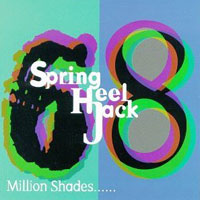
Now I’ve no idea if it’s what people would associate with my productions. But, yeah, if you twisted my arm this would be the record that changed my life. I don’t know if it’s the best record Spring Hill Jack made. That could be Busy Curious Thirsty. Yet it’s the one that opened my ears and eyes. And indirectly it led to me wanting to get involved in music. So these are the guys to blame!
I still get very defensive about this record. Even now, occasionally you come across old headz who moan about it not being real. I never worked out what that means. Real what? Real drum’n’bass? Who cares? Did anyone actually ever claim it was? True enough, I suppose, it wasn’t wrought from the streets of Hackney, but that’s like looking back at punk and saying only the Exploited or whatever mattered, and people like Wire weren’t real enough. Ridiculous. What I loved about music inspired by drum’n’bass was that it came from all directions and backgrounds, touching so many people, drawing people in from so many directions, from A Guy Called Gerald to Klute to Espiritu to Anjali – all of which I loved.
I can’t remember exactly where or when I first heard Spring Heel Jack, but musically I must have been a bit confused at the time. I guess Stereolab would have been my favourite group around then. And I was reading everything I could about them, and beginning to pick up on some of the sounds that got talked about in reviews and interviews. I must have got hold of a copy of The Wire around then with Tim and Laetitia featured, and I remember reading about Spring Heel Jack and thinking this could be for me.
I liked drum’n’bass, but I felt very remote from the club scene, and instead used to tape stuff off the pirate stations. And I wasn’t part of the group of kids that were into drum’n’bass at school, so I was enjoying having a bit of a secret passion. So I kind of took a perverse delight in liking the stuff that was drum’n’bass but not drum’n’bass. Like Spring Heel Jack, and Luke Vibert’s Drum ’n’ Bass For Papa Plug thing. I wasn’t making any big statement by not banging on about hardcore. I just like the jumbled up variations. Who cared if it wasn’t pure? Probably only ex-public schoolboys who do blogs now. I have to confess the sense of blasphemy did appeal though.

So indirectly the Spring Heel Jack records got me into the idea of sounds. And reading about the guys’ backgrounds, and how they brought such different things to the party, like modern composition and northern soul, that seemed so glamorous to a suburban schoolboy. I loved all that. And somehow I realised this messing about with sounds in studios was what I wanted to do. So when it came time to do work experience, I made sure I got to do mine in a local studio. I did little more than make the tea, but it was enough to get me hooked. It was somewhere I felt I belonged.
Back in those days I really dreamed of working upstairs at the Strongroom, in Shoreditch. Those studios became a wonderfully mythical place in my imagination. I kept seeing the name Mads Bjerke on records, and The Strongroom. And I kind of came to realise gradually that what he was doing with Spring Heel Jack there was somehow at the centre of a big spider’s web. Around that time, or maybe a little later, a lot of people were getting into Spiritualized and their Ladies And Gentlemen set. I knew John Coxon of Spring Heel Jack and Mads Bjerke were involved, but I just couldn’t pick up anything from it. It left me cold.
But a lot of people I trusted were raving about Spiritualized, Radiohead and The Verve. It was like an unspoken agreement that these were the people to like now. This was around the time of James Lavelle’s U.N.K.L.E. There was this flirtation with space rock. I knew Spring Heel Jack were associated with all of this. Post-rock or whatever nonsense it was called. I had bought a Disco Inferno record because it was produced by John Coxon and Mads Bjerke. It was ok, but it didn’t really have that bit of magic that gets the pulses racing. I hated the vocals. And then there was Bark Psychosis who really did not live up to their name. Mind you their main man Graham Sutton returned as Boymerang with some cracking drum’n’bass stuff. He did some great stuff with Anjali too. Funnily enough Mads Bjerke went on to work with her later. I’d love to do something with her too.
I am aware of the later Spring Heel Jack records, but I haven’t really kept up with them. The avant garde, free jazz collaborations. I have to say these days I’m more interested in some of the records John Coxon was involved in earlier on. I suppose that’s partly because some of these were among the first records I picked up on. Like Definition of Sound’s Love And Life. Goodness knows what happened to those guys. I absolutely loved that LP. The hits were great sure. Now is Tomorrow and Wear Your Love Like Heaven. But some of the other tracks were more interesting. I don’t know if they were directly influenced by Massive Attack. Or whether they were just working in the same arena. Whatever. The downbeat, deeper stuff was great. Mixing up hip hop, house, soul, reggae and all sorts of odd things. Still works for me. A real lost classic.

Ah and then of course there was the great Betty Boo. My one true love. John Coxon and Mads Bjerke worked closely with the great lady on her criminally ignored second LP, Grrr! It’s Betty Boo. It still sounds like great fun today. It’s incredibly misunderstood. You can’t define Betty. She’s a mess of contradictions. She’s got this cheeky chirpy persona, but she put in her apprenticeship, which is why it works so well. She was there in the early days of UK hip hop with the She Rockers, hanging out with Public Enemy. She knew what she was doing. And that’s what I try to get across to some of the young kids I work with now. They think you can just walk into a studio and become an instant success. But I say you’ve got to go away and work at it, develop your character, learn your trade. It doesn’t matter if you are Betty Boo or the Sex Pistols or Spring Heel Jack.
And the funny thing is I only noticed recently when sorting through some old records that John Coxon’s name is buried in the credits for Bomb The Bass’ Unknown Territory which is from that same era. It’s a record I didn’t pick up on until much later. I was really young then don’t forget. But in my opinion it invented the future. All the big beat exploitation industry can be traced back to that set, and connections like Depth Charge and Renegade Soundwave. I think Tim Simenon is one of the great unsung heroes of pop. It was the later Clear LP that I got into first. And that’s such an uncompromising record. I had no idea at the time that the people involved on these Bomb The Bass records were the legendary On-U label and earlier still the Sugarhill stuff, and I suppose that’s partly why it holds up so well.
I think one of the reasons I’ve returned to the Bomb The Bass stuff is that I’ve been working on a record of my own at last which involves a whole host of collaborators chipping in. Some known. Some totally unknown. Now that can be a real recipe for disaster. But I’m determined to avoid all the obvious pitfalls, so I’ve been soaking up the records where that sort of stuff has really worked, and those two Bomb The Bass records are the best examples for me. Bomb The Bass. Spring Heel Jack. I like that legacy of interacting with people from so many different walks of music.
© 2007 John Carney